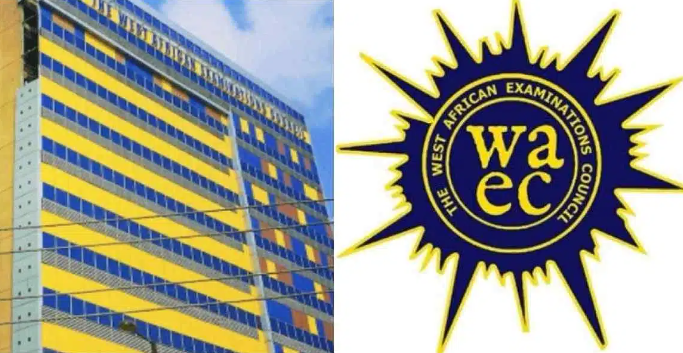
Midnight Exams and a Billion-Naira Blow: WAEC Faces Unprecedented Lawsuit Over Student Rights Abuse

In what could become one of the most consequential education-related legal showdowns in Nigerian history, the West African Examinations Council (WAEC) and the Federal Ministry of Education are now in the eye of a legal storm. A staggering ₦100 billion lawsuit has been filed against them over shocking revelations that students were forced to sit for national exams—most notably English Language—as late as 8 p.m., under dim lighting and in highly insecure conditions during the 2025 West African Senior School Certificate Examination (WASSCE).
The suit, lodged at the Federal High Court in Lagos by renowned human rights lawyer Evans Ufeli, is already generating seismic ripples across the country’s educational and legal communities. Representing a group of affected students, Ufeli is accusing the examination body and the supervising ministry of gross administrative negligence, alleging that their actions—or lack thereof—violated not only constitutional safeguards but also fundamental human rights.
According to the filed documents, the late-night exams weren’t isolated incidents. Students across multiple centers reportedly endured hours of waiting due to late delivery of exam materials, logistical mix-ups, and last-minute venue changes. Some reportedly began their English Language papers well after sunset, with flashlights and generator-powered bulbs providing barely enough illumination for the tasks at hand. In certain centers, no light was available at all. Students wrote in darkness, against the ticking clock, surrounded by the unsettling hum of insecurity.
“This is more than a breach of protocol—it is a humanitarian failure,” Ufeli stated outside the courtroom. “We are talking about minors, children, who were mentally and physically exhausted, subjected to degrading conditions in what should have been one of the most important days of their academic journey.”
Citing Sections 33 to 36 and 46 of the Nigerian Constitution, as well as the Child Rights Act and the African Charter on Human and Peoples’ Rights, Ufeli argues that the exam fiasco constitutes a violation of the right to dignity, the right to life, and the right to a fair and equitable educational environment. He emphasized that these rights are not mere formalities—they are protected by law and must be respected by all state actors, including WAEC and the Federal Ministry of Education.
In what appears to be a sweeping legal strategy, Ufeli is not only demanding monetary compensation but also seeking structural reforms. His prayers to the court include a re-sit of all affected examinations, a formal and public apology from WAEC and the education ministry, and a court-ordered review of the exam body’s entire logistical and planning framework.
“The State and its agencies cannot sacrifice the mental well-being and future of our children on the altar of bureaucratic incompetence,” Ufeli declared, adding that reports from the National Assembly, various civil society organizations, and media outlets corroborated his claims. These reports described exam centers in chaos, overwhelmed supervisors, missing papers, and widespread confusion that turned what should have been an orderly national exercise into a traumatic ordeal.
Parents, advocacy groups, and education stakeholders have begun weighing in, many expressing anger and disbelief. On social media platforms and radio call-in shows, parents described frantic nights spent waiting outside exam centers, with some recounting how their children returned home in tears, too exhausted to speak.
“This isn't just about bad planning,” said a parent in Abuja whose child was among those affected. “This is about a lack of empathy and accountability from the very people entrusted with our children’s futures.”
As Nigeria’s educational infrastructure continues to come under scrutiny, the implications of this lawsuit could be far-reaching. Experts say a ₦100 billion payout, while unlikely in full, signals the seriousness of the case and the growing public intolerance for institutional lapses, especially where children are concerned.
Legal observers suggest the case could also open the door for broader reforms in the management of national exams. “If this suit succeeds in any form,” noted a legal analyst based in Lagos, “it would set a powerful precedent, possibly compelling all examination bodies to adopt stricter contingency protocols and student-centered approaches in the future.”
While WAEC has yet to officially respond to the lawsuit, insiders suggest that the body is preparing a robust defense, potentially arguing that the delays and disruptions were caused by factors beyond its control, such as security concerns in certain states and unexpected logistical hitches.
Still, critics argue that such excuses may not hold water in court, especially since the examination council has a longstanding mandate to ensure the safety and fairness of its exams. The fact that students were left vulnerable and academically disadvantaged, regardless of intent, is likely to form the crux of the legal and moral argument.
No hearing date has been announced yet, but the case is already setting the stage for a reckoning in Nigeria’s education sector. For students and parents who endured what they describe as a nightmare, the lawsuit offers a glimmer of hope that their voices will be heard—and that change might finally come to a system long plagued by inefficiency and neglect.
As the nation awaits the unfolding of this potentially landmark legal battle, one thing remains clear: education is not just about grades and certificates—it is about dignity, fairness, and the fundamental rights of every child. And when those rights are trampled in the name of procedure, it is the law’s duty to restore justice.
Whether this ₦100 billion lawsuit will succeed in full or in part remains to be seen. But its message echoes loudly across the classrooms and corridors of Nigerian schools: the days of silent suffering may finally be over.


